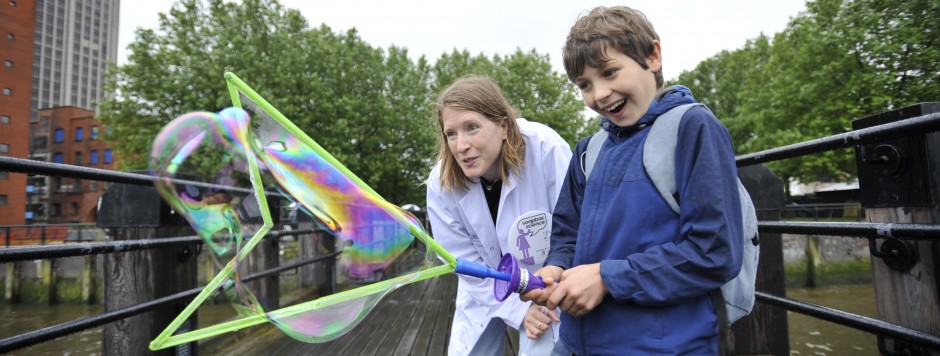 Dr Jennifer Rudd (@jruddchemist)has always been interested in applied science and travelling. She spent her Masters year in Germany, followed by a PhD in Switzerland. Dr Rudd then received a Fellowship from the Swiss National Science Foundation and spent 18 months in America. (She is pictured here at the Wright Brother’s Memorial, North Carolina, USA.) Dr Rudd wants to contribute to the international efforts to mitigate the effects of climate change. She has worked on next generation solar cells, produced hydrogen from water and has now turned her attention to carbon dioxide. Dr Rudd’s current project at the Energy Safety Research Institute at Swansea University is turning carbon dioxide into the fuels of our future.
Dr Jennifer Rudd (@jruddchemist)has always been interested in applied science and travelling. She spent her Masters year in Germany, followed by a PhD in Switzerland. Dr Rudd then received a Fellowship from the Swiss National Science Foundation and spent 18 months in America. (She is pictured here at the Wright Brother’s Memorial, North Carolina, USA.) Dr Rudd wants to contribute to the international efforts to mitigate the effects of climate change. She has worked on next generation solar cells, produced hydrogen from water and has now turned her attention to carbon dioxide. Dr Rudd’s current project at the Energy Safety Research Institute at Swansea University is turning carbon dioxide into the fuels of our future.
Dr Rudd will be taking part in Soapbox Science Swansea on Saturday 23rd June 2018 with the talk: “Converting carbon dioxide into the fuel of the future”
SS: How did you get to your current position?
JR: Interestingly it was Soapbox Science, in a convoluted manner! I volunteered at the 2015 Swansea SS and met Dr Charles Dunnill from whom I learnt about the Energy Safety Research Institute (ESRI), 2 years and 1 little boy later I interviewed at ESRI with Charlie’s colleague Dr Enrico Andreoli [and got the job!].
The longer story is that I did an undergraduate degree at the University of York in chemistry, then a PhD in Switzerland working on dye-sensitised solar cells and catalysts for water splitting. This was followed by a Fellowship to work in North Carolina, USA working on water splitting (again!) and now I’m at ESRI trying to convert carbon dioxide into fuels.
SS: What, or who, inspired you to get a career in science?
JR: My Mother is a mathematician and my Dad is a marine engineer (and an ex-submariner). I always thought I would be an engineer but I didn’t like physics. Then I decided to be a professional clarinet player but my music teacher told me that if I did science I could always keep playing clarinet. If I stayed with the clarinet I would lose my science. I chose science. I also had some great [female] chemistry teachers at school.
SS: What is the most fascinating aspect of your research/work?
JR: I love knowing that the work I do can solve a pressing problem. The levels of carbon dioxide in the atmosphere have reached unprecedented levels and we have to work on a global scale to reduce them. What better way could there be than turning them into the fuels that our energy-hungry world needs?
SS: What attracted you to Soapbox Science in the first place?
JR: Soapbox Science is a fantastic opportunity to engage with the public. I think that the time of the stereotypical stuffy academic sat in an office thinking lofty thoughts is over. Taxpayers pay a portion of my salary and they are owed an explanation of what that money goes towards. In addition, the general public need to know about the rising levels of carbon dioxide and the implications of that on our future. Hopefully I will have an impact on people’s carbon footprints from taking part in this event.
SS: Sum up in one word your expectations for the day
JR: Anticipation
SS: If you could change one thing about the scientific culture right now, what would it be?
JR: I would change how primary caregivers are seen and the support mechanisms in place for them. Academia is an all-encompassing endeavour and this means that trying to balance work and a family life is a real challenge. In addition, researchers on part-time contracts can be seen as less committed than their full-time counterparts. Accepting that caring is not just a female role would be a real step forward as would more funding being made available for researchers needing flexible working conditions.
SS: What would be your top recommendation to a female PhD student considering pursuing a career in academia?
JR: Don’t be put off. If someone says no, find someone who will say yes – that’s how I ended up in Switzerland and America!
